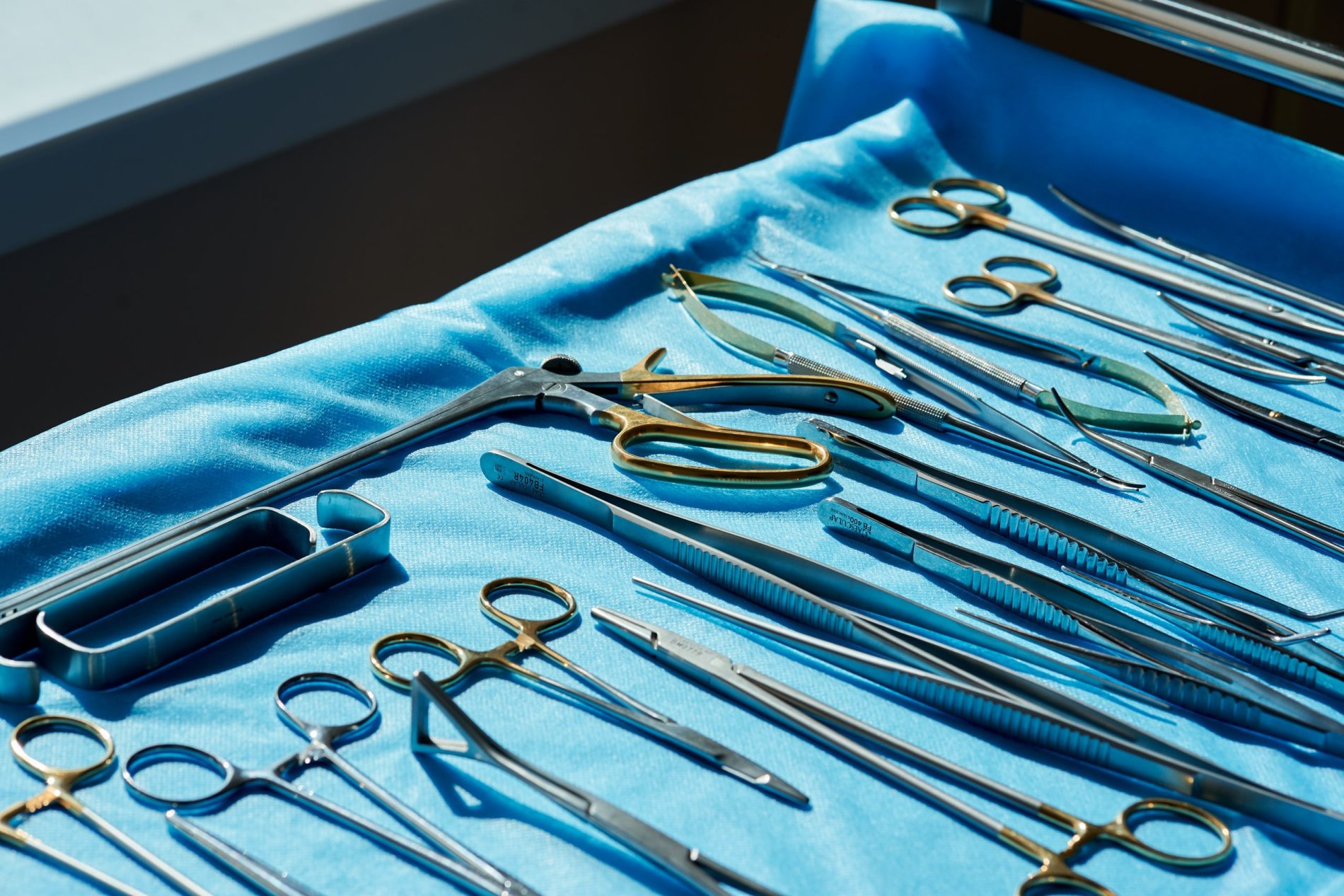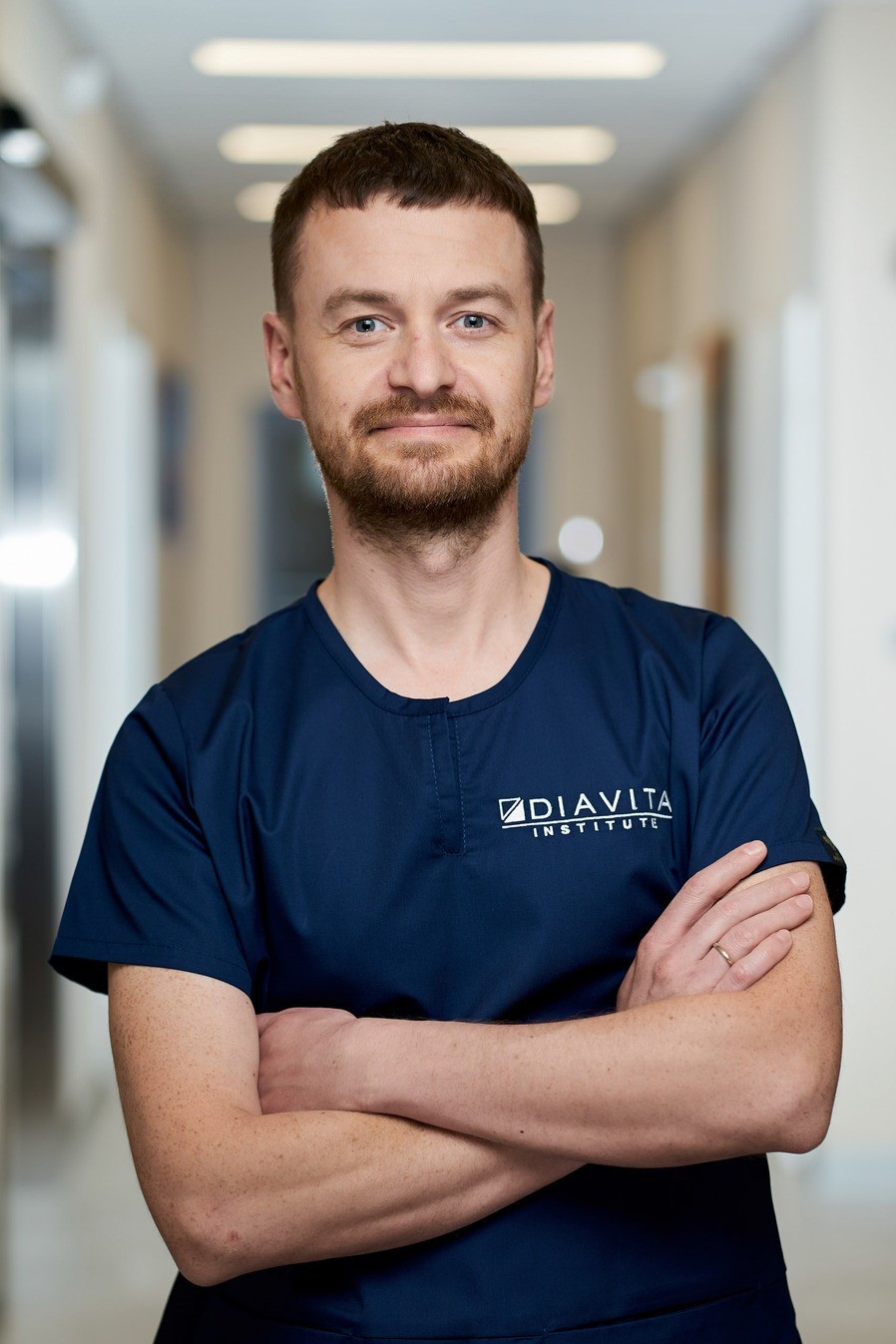
The competence of vascular surgeons is operative treatment of phlebological diseases: telangiectasias manifested by vascular stars or nets (reticular varicose veins), varicose veins, varicothrombophlebitis, chronic venous insufficiency, post-thrombotic disease, thrombotic disease.
At the Diavita Institute, vascular surgery specialists have extensive practical experience, use a multidisciplinary approach when working with complex diagnoses, provide full patient support at all stages of treatment, and provide all necessary recommendations for the recovery period.
How is varicose veins of the lower extremities manifested? Here are the main symptoms:
- Visible veins: Swollen, discolored veins on the surface of the skin that may be blue, purple, or red in color.
- Pain and discomfort: Pain, heaviness, or discomfort in the legs, especially when standing or sitting for long periods of time.
- Edema: Swelling of the legs, especially at the end of the day or after a long period of standing or sitting.
- Skin changes: Exaggerated skin sensitivity, dryness, itching or discoloration around varicose veins.
Indications for minimally invasive treatment of varicose veins are defined as:
- Pain and discomfort: If varicose veins cause pain, discomfort or discomfort, especially if it interferes with normal daily activities.
- Deterioration of the quality of life: If varicose veins disrupt the quality of life, cause aesthetic discomfort or psychological concerns.
- Complications: In the presence of complications, such as trophic ulcers, vein inflammation (thrombophlebitis) or bleeding from varicose veins.
- Risk of complications: In people at high risk of blood clots or complications such as thrombosis, varicose dermatitis or ulcers.
An arteriovenous fistula is a surgical access route created during a patient preparation program for replacement therapy with an artificial kidney device. This method allows you to effectively carry out hemodialysis procedures, which are necessary to clean the blood of toxins and remove excess fluid.
The indication for creating an arteriovenous fistula is renal failure, which requires hemodialysis procedures.
Creation of arteriovenous fistulas for hemodialysis:
- Selection of vessels: Individual, veins in the arm such as the radial or cubital vein and arteries are often used.
- Surgical intervention: A surgeon creates a fistula by surgically connecting an artery and a vein, which provides effective vascular access during hemodialysis.
- Duration of formation: A fistula may require several weeks or months to allow adequate blood supply and stability.
- Support and management: Regular examination of the fistula by a doctor for early detection and prevention of possible complications.
The main advantages of arteriovenous fistula:
- Long-term access: Once a fistula is created, it can be used for a long time for hemodialysis without the need for other access procedures.
- Effectiveness: Provides effective blood flow through the hemodialysis machine, which allows you to effectively cleanse the blood of toxins.
Creation of arteriovenous fistulas for hemodialysis is an important procedure to ensure effective treatment of patients with chronic renal failure.
Our specialists prefer minimally invasive methods of surgical treatment. Such methods provide excellent results, painlessness, allow interventions to be performed even in patients with serious comorbidities, help reduce hospital stay and ensure a high quality of life.
At Diavita Institute, we use advanced technologies and treatment methods to solve problems related to varicose veins, as well as the creation of arteriovenous fistulas when indicated. Our team of experts implements a comprehensive approach to each patient in order to achieve optimal results.
Experienced doctors, fast and accurate diagnosis, effective treatment methods - at the Diavita Institute
Modern methods of treatment
We use advanced technologies and methods to provide effective and safe treatment for our patients
Qualified team
Our specialists have extensive experience in vascular surgery and phlebology and are able to provide high-quality medical care
Individual approach
Each patient receives an individually tailored treatment based on evidence-based medicine, taking into account their unique needs and health status
Consultation of a vascular surgeon is necessary for the following symptoms:
- pain in calf muscles, lower legs while walking;
- a feeling of heaviness in the legs, which increases in the evening;
- a feeling of coldness and numbness of the limbs or individual parts of the body;
- severe pain in the area of the feet;
- darkening of the fingers, a change in the color of the skin on the hands or feet;
- the appearance of vascular "stars" and "snakes", the manifestation of capillaries on the legs.
You should consult a doctor if you have diabetes, atherosclerosis, or hypertension: all these diseases are accompanied by pathological changes in blood vessels.
We use a variety of techniques, such as sclerotherapy, laser ablation, minimally invasive surgery, and others, depending on the individual needs of each patient.
In most cases, minimally invasive procedures for the treatment of vascular diseases can be performed on an outpatient basis without hospitalization.
Usually, the process of creating an arteriovenous fistula can take several hours. However, the time required for the fistula to grow and to form a stable function may take several weeks or even months.
After creating an arteriovenous fistula, it is important to follow the doctor's recommendations for its care. This includes proper wound care, avoiding excessive physical stress on the fistula area, and regular medical examinations for early detection of any complications.





